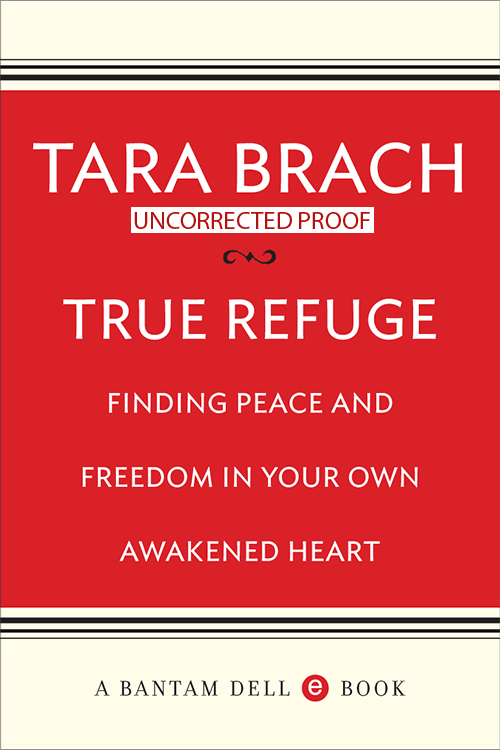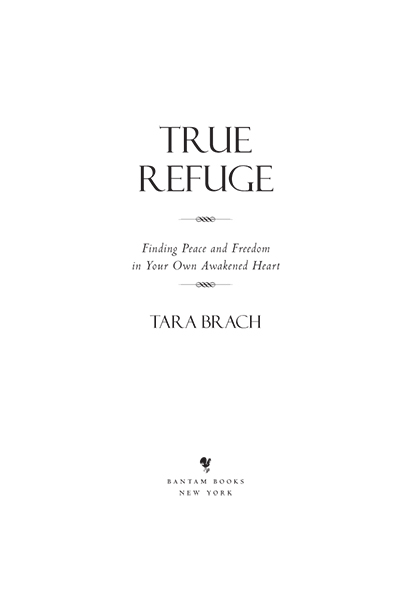True Refuge: Finding Peace and Freedom in Your Own Awakened Heart
Read True Refuge: Finding Peace and Freedom in Your Own Awakened Heart Online
Authors: Tara Brach
Tags: #Body, #Mind & Spirit, #Prayer & Spiritual, #Healing


Advance Reader's Copy â Not for Sale
TRUE REFUGE
Finding Peace and Freedom in Your Own Awakened Heart
Tara Brach
Bantam
This is an uncorrected eBook file. Please do not quote for publication until you check your copy against the finished book.
Tentative On-Sale Date: January 29, 2013
Tentative On-Sale Month: February 2013
Tentative Print Price: $26.00
Tentative eBook Price: $13.99
Please note that books will not be available in stores until that above on-sale date. All reviews should be scheduled to run after that date.
Publicity Contact:
(212) 782-8678
www.bantamdell.com
Bantam Books
An imprint of the Random House Publishing Group
1745 Broadway ⢠New York, NY ⢠10019
Also by Tara Brach
Radical Acceptance

This is an uncorrected eBook file. Please do not quote for publication until you check your copy against the finished book.
The names, identifying characteristics, and other details of the clients, students, and other case studies presented in this book have been changed to protect the privacy and preserve the confidences of those individuals and their families.
Copyright © 2012 by Tara Brach
All rights reserved.
Published in the United States by Bantam Books, an imprint of The Random House Publishing Group, a division of Random House, Inc., New York.
B
ANTAM
B
OOKS
and the rooster colophon are registered trademarks of Random House, Inc.
ISBN: 978-0-553-80762-2
eBook ISBN: 978-0-345-53862-8
www.bantamdell.com
Book design by Karin Batten
To Jonathan, whose heart is a loving, safe refuge,
and good humor, one of this life's great delights.
Guided Reflections and Meditations
Prologue: “Loving Life No Matter What”
2. Leaving Home: The Trance of Small Self
3. Meditation: The Path to Presence
5. RAIN: Cultivating Mindfulness in Difficult Times
6. Awakening to the Life of the Body
7. Possessed by the Mind: The Prison of Obsessive Thinking
9. Heart Medicine for Traumatic Fear
10. Self-Compassion: Releasing the Second Arrow
12. Holding Hands: Living Compassion
13. Losing What We Love: The Pain of Separation
Part IV: The Gateway of Awareness
Two: Lovingkindness: Being Kind to Yourself
Four: Remembering the Most Important Thing
Five: Bringing RAIN to Difficulty
Nine: Lovingkindness: Receiving Love
Tonglen: A Healing Presence with Fear
Eleven: A Forgiving Heart Toward Others
Twelve: Tonglen: Awakening the Heart of Compassion
Lovingkindness: Seeing Past the Mask
Thirteen: Prayer in the Face of Difficulty
I wish I could show you
When you are lonely or in darkness,
The astonishing light
Of your own Being!
â
HAFIZ
(as translated by Daniel Ladinsky)
“Loving Life No Matter What”
My earliest memories of being happy are of playing in the ocean. When our family began going to Cape Cod in the summer, the low piney woods, high dunes, and wide sweep of white sand felt like a true home. We spent hours at the beach, diving into the waves, body surfing, practicing somersaults underwater. Summer after summer, our house filled with friends and familyâand later, with spouses and new children. It was a shared heaven. The smell of the air, the open sky, the ever-inviting sea made room for everything in my lifeâincluding whatever difficulties I was carrying in my heart.
Then came the morning not so long ago when two carloads of friends and family members took off for the beach without me. From the girl who had to be pulled from the water at suppertime, I'd become a woman who was no longer able to walk on sand or swim in the ocean. After two decades of mysteriously declining health, I'd finally gotten a diagnosis: I had a genetic disease with no cure, and the primary treatment was painkillers. As I sat on the deck of our summer house and watched the cars pull out of the driveway, I felt ripped apart by grief and loneliness. In the midst of my tears, I was aware of a single longing. “Please, please, may I find a way to peace,
may I love life no matter what.
”
This book came out of my own search for a place of peace, connectedness, and inner freedom, even in the face of life's greatest challenges. I call this place “true refuge” because it does not depend on anything outside ourselvesâa certain situation, a person, a cure, even a particular mood or emotion. The yearning for such refuge is universal. It is what lies beneath all our wants and fears. We long to know we can handle what's coming. We want to trust ourselves, to trust this life. We want to live from the fullness of who we are.
My search for refuge led me deeper into the spiritual teachings and Buddhist meditation practices that were so central to my life. I am a clinical psychologist and had been teaching meditation for over thirty years. I am also the founder and senior teacher at the Insight Meditation Center in Washington, D.C. My inner work and work with others gave rise to my first book,
Radical Acceptance,
and I also started training psychologists and laypeople on how to bring meditation into emotional healing. Now, as the insecurity of this existence shook my inner world, the teachings that had always guided me became more embodied and alive.
In the Buddhist tradition in which I teach, the Pali word “dukkha” is used to describe the emotional pain that runs through our lives. While it is often translated as “suffering,” dukkha encompasses all our experiences of stress, dissatisfaction, anxiety, sorrow, frustration, and basic unease in living. The word “dukkha” originally referred to a cart with a damaged wheel. When we are suffering, we are out of balance, jolting uncomfortably along the road of our life. We feel broken or “off,” disconnected from a sense of belonging. Sometimes this shows up as mild restlessness or discontent; at other times, as the acute pain of grief or grip of fear. But if we listen deeply, we will detect beneath the surface of all that troubles us an underlying sense that we are alone and unsafe, that something is wrong with our life.
In
Radical Acceptance,
I wrote about the deep and pervasive suffering of shame, the pain of believing that “something is wrong
with me.
” I am now addressing dukkha in a broader sense. Since that book was published, I've encountered major lossâthe death of my father, the physical and mental decline of dear ones, and the challenges of my own chronic illness. Many of my students have also had their lives overturned. Some have been uprooted from their jobs; they worry about having enough to live on, and are hungry for meaningful work. Others are estranged from family and friends, and long for connection. Many more are grappling with aging, sickness, and the inevitability of death. For them, “Something is wrong with me” has become entangled with the pain of struggling against life itself.
The Buddha taught that this experience of insecurity, isolation, and basic “wrongness” is unavoidable. We humans, he said, are conditioned to feel separate and at odds with our changing and out-of-control life. And from this core feeling unfolds the whole array of our disruptive emotionsâfear, anger, shame, grief, jealousyâall of our limiting stories, and the reactive behaviors that add to our pain.
But the Buddha also offered a radical promise, one that Buddhism shares with many wisdom traditions: We can find true refuge within our own hearts and mindsâright here, right now, in the midst of our moment-to-moment lives. We find true refuge whenever we recognize the silent space of awareness behind all our busy doing and striving. We find refuge whenever our hearts open with tenderness and love. We find refuge whenever we connect with the innate clarity and intelligence of our true nature.
In
True Refuge,
I use the word “presence” to try to capture the immediacy and aliveness of this intrinsic awareness. Presence is hard to describe, because it's an embodied experience, not a concept. For me, when I sense the silent, inner wakefulness that is here, I come home to a sense of wholeness. I'm at home in my body and heart, at home in the earth and with all beings. Presence creates a boundless sanctuary where there's room for everything in my lifeâeven the illness that keeps me from surfing the waves.
This book is filled with stories of people discovering presence in the midst of crisis and confusion. It also explores some of the greatest challenges I myself have faced over these past decades. I hope some of these stories connect to the heart of your own situation. Through them, we'll explore the forces that draw us away from presence, and why we so often pursue false refuges. I also suggest many different practicesâsome ancient, some new, some specifically supported by modern neuroscienceâthat have reliably opened me and many others to presence. These include one of the most practical, in-the-trenches mindfulness meditations I've worked with in years. Called RAIN (an acronym for the four steps of the process), it helps you address many difficult emotions on the spot and can be personalized to almost any situation.
True Refuge
is organized around three fundamental gateways to refuge that are found in every stream of Buddhism as well as within many other traditions: truth (of the present moment), love, and awareness. As you will see, each of these gateways opens us directly to healing and spiritual freedom. They are the keys to overcoming very common difficulties such as obsessive thinking, limiting beliefs, and traumatic fear, and to tapping into self-compassion and intimacy in relationships. They are also the key to finding peace and happiness, to being at home in our lives.
That day on Cape Cod I didn't know if I could ever be happy living with a future of pain and physical limitation. While I was crying, Cheylah, one of our standard poodles, sat down beside me and began nudging me with concern. Her presence was comforting; it reconnected me to the here and now. After I'd stroked her for a while, we got up for a walk. She took the lead as we meandered along an easy path overlooking the bay. In the aftermath of grieving, I was silent and open. My heart held everythingâthe soreness of my knees, the expanse of sparkling water, Cheylah, my unknown future, the sound of gulls. Nothing was missing, nothing was wrong. These moments of true refuge foreshadowed one of the great gifts of the Buddhist pathâthat we can be “happy for no reason.” We can love life just as it is.
If you are drawn to this book, you are already awakening on a path of true refuge. Perhaps you've been at war with yourself and want to be more kind. You may be struggling with an addiction and long to free your life from compulsion and shame. You may be facing lossâof a job, of someone you love, of your health in body and mindâand wonder if your heart will ever be whole again. You may be grieving the enormity of suffering in our world, and searching for a way to be part of the healing.
No matter how challenging the situation, there is always a way to take refuge in a healing and liberating presence.
Writing this book has been a journey of discovery, as I learned every day from my own experiences and from those around me. My prayer is that these teachings and practices will offer you company and confidence as we walk the spiritual path together.